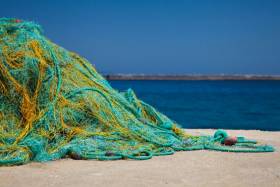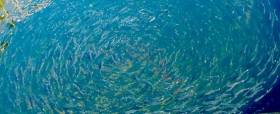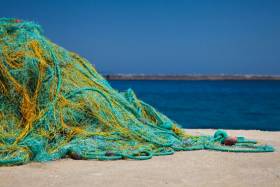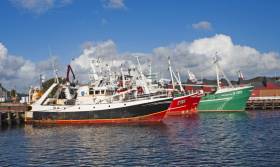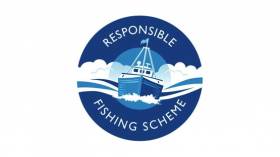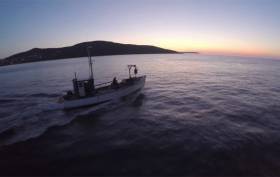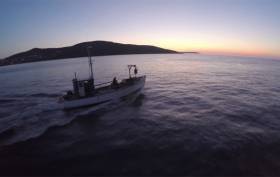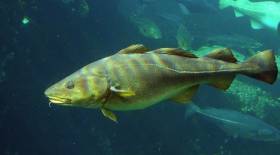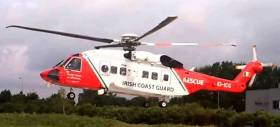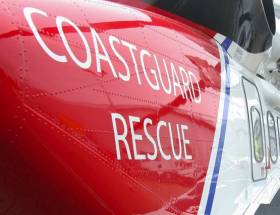Displaying items by tag: Fishing
#Fishing - Marine Minister Michael Creed today (Wednesday 1 June) met with the leaders of Irelands’ fish producer and exporting organisations to discuss various issues including the commitment under the Programme for Government to dealing with the issue of penalty points for serious infringements of the Common Fisheries Policy.
Minister Creed said that the meeting was “a very positive engagement and that he looked forward to working closely with all of the organisations on both the challenges and the opportunities for Ireland’s fisheries sector over the coming years.”
The minister discussed a wide range of issues with industry representatives and, in particular, their concerns in relation to the implementation of the CFP penalty points system.
On this matter, he confirmed that upon taking office he requested that the Attorney General consider whether there is a way that the assignment of EU points for licence holders can await the completion of the prosecution process, while at the same time ensuring that Ireland is fully in compliance with its obligations under EU law.
"Further to the Programme for Government commitment pertaining to the assignment of penalty points, I quickly sought advice from the Attorney General as prescribed in the document," he said. "Having now received this advice, I am satisfied to move on the introduction of a system for the sequential application of EU points in conjunction with the prosecution process, thus fulfilling the ambition outlined in the Partnership Programme."
The minister acknowledged that this move was subject to addressing some important legal and administrative issues in order to ensure compliance with EU law.
“I have today listened to the concerns of industry and intend to report back to the Oireachtas as soon as I have finalised a way forward in the context of dealing with legal and administrative matters that are arising," he added.
"However I am confident that these matters can be dealt with in a collaborative and constructive manner with all stakeholders.”
Among the other topics covered in today’s meeting were the potential impacts of ‘Brexit’ on the Irish fishing industry, the ongoing phasing in of the landing obligation or ‘discards ban’ under the new Common Fisheries Policy, the herring fishery off the North West coast, EU funding, decommissioning of fishing vessels, negotiations with Norway and the Faroe Islands, and the Killybegs Fisheries Harbour Centre.
“Today’s meeting was all about getting a deeper understanding of the issues facing the Irish fishing industry and I very much appreciated the positive engagement with industry leaders," the minister concluded.
New Marine Minister Announces €4.3M EMFF Grants To Seafood Processing & Aquaculture Sectors
#Seafood - New Marine Minister Michael Creed yesterday (Friday 27 May) announced the award of €4.3 million in grants to 51 seafood enterprises under five schemes launched earlier this year under the European Maritime and Fisheries Fund (EMFF) Operational Programme for the seafood sector.
The grants are co-funded by the Exchequer and EMFF and subject to terms and conditions.
“The EMFF Seafood Development Operational Programme was only adopted in December 2015 and I am delighted that it has so quickly seen these significant investments in our seafood sector provided with the financial supports that will ensure that these critical investments can be implemented," said the minister.
"Collectively, these investments will deliver jobs to coastal communities, develop new value added seafood products, develop new markets and further sales for our seafood products, and develop knowledge and new processes in aquaculture production, disease management and animal husbandry.
"These investments will assist seafood enterprises to contribute to the ambitious growth targets we have set for our processing and aquaculture sectors. I expect to announce further grant offers under these schemes in the coming months."
The grant offers are made under five EMFF Schemes. For the processing sector, €3.4 million was awarded to 27 enterprises under the Seafood Capital Investment Scheme towards total investment of €19.4 million. These investments are projected to create 316 jobs by 2019 and additional sales of €77 million by 2019.
In addition, €157,000 was awarded to four enterprises under the Seafood Scaling and New Market Development Scheme towards total investment of €335,000 and €164,000 was awarded to eight enterprises under the Seafood Innovation and Business Planning Scheme towards total investment of €328,000.
For the aquaculture sector, €199,000 was awarded to four enterprises under the Knowledge Gateway Scheme towards total investment of €305,000, while €382,000 was awarded to eight enterprises under the Sustainable Aquaculture Scheme towards total investment of in excess of €1 million.
Further details of the schemes concerned are available at the BIM website HERE.
Cork Trawler Owner & Skipper Fined Over Safety Breaches
#Fishing - Out-of-date safety equipment has seen a Cork trawler skipper and owner landed with €4,000 in fines, as RTÉ News reports.
Pat O'Mahony of Kinsale and the Crosshaven-based Labardie Fisher Ltd pled guilty at district court in a case taken on behalf of the Minister for Transport, Tourism and Sport.
The former was convicted of having expired distress signals and hydrostatic life raft releases on his fishing trawler on 5 October last year.
Meanwhile, the trawler owner was fined on a charge of arriving in port with expired distress signals, and for failing to send the port superintendent a signed crew manifest as of 28 May last year.
The court heard that both skipper and owner, who lost 12 days of fishing during the investigation, co-operated fully during the process.
RTÉ News has more on the story HERE.
Low Numbers Apply For Migrant Fishing Crew Permits
#Fishing - The Migrant Rights Centre Ireland (MRCI) has called on the deadline for applications for migrant fishing work permits to be extended as it has emerged that only 60 applications have been received.
Last November, then Marine Minister Simon Coveney announced that renewable work permits for non-EEC nationals in the Irish fishing industry would be limited to 500.
The move came in the wake of damning claims of widespread exploitation of migrant labour in the fishing fleet around Ireland, allegations that were later criticised by many in the industry.
But as The Irish Times reports, the new scheme to protect migrant workers from low pay and long hours has attracted only 60 applications as of last week.
And while the Department of Justice said it expected a late surge before the deadline yesterday (Sunday 15 May), the MRCI argues the current scheme is flawed as it is tied to employers and does not allow crew to apply as independent workers.
The Irish Times has more on the story HERE.
M&S Signs Up For New Responsible Fishing Scheme
#Fishing - The UK's new voluntary Responsible Fishing Scheme (RFS) has received a boost as Marks & Spencer became the first retailer to sign up to its charter for sustainable fishing.
From next year all British fishing boats supplying M&S supermarkets will have to be certified by the RFS, confirming that any seafood they catch has been done so responsibly and that their crews have a safe working environment.
International fishing fleets have until 2021 to get certified under the scheme if they're to continue supplying M&S stores.
“We’re passionate about being a responsible retailer," M&S food director Andy Adcock told edie.net about the move, part of the retailer's Plan A sustainability programme.
"We only buy fish from the most sustainable sources, a commitment we’ve worked tirelessly on for almost 20 years, and this pledge means our customers can shop with us knowing we’ve done everything possible to protect the marine environment and those working in our fish supply chain.”
However, M&S is candid that it can't influence the fishing industry alone, with the company's Hannah Macintyre saying that more collaboration will be needed across the industry to ensure that the RFS "will do for fishing standards what the MSC has done for fish stocks".
edie.net has more on the story HERE.
'Atlantic' Director Talks Impact Of Economic & Ecological Change On Coastal Communities
#Documentary - "It’s about understanding the ocean, working with the ocean. Not just seeing it as something to grab, but as something you look after."
That's the message of new documentary Atlantic by Irish filmmaker Risteard Ó Domhnaill, who spoke to Ian Maleney for The Irish Times on its release in Irish cinemas yesterday (Friday 29 April).
As previously reported on Afloat.ie, the feature-length documentary – narrated by Emmy Award-winner Brendan Gleeson – follows the fortunes of three small Atlantic coastal fishing communities in Ireland, Canada and Norway.
Each facing their own challenges, from the impact of oil exploration and climate change to the pressures of large-scale commercial fishing.
And as Ó Domhnaill relates from his experience making the film, these livelihoods have changed dramatically even in only the last five years.
"Who knows what’s going to happen, what’s going to hit the ocean?" he says of the years ahead. "Acidification, warming of currents? We’re facing a crossroads. We can’t just fence off our part of the sea and say ‘We’ll look after that’. It’s a much bigger challenge."
The Irish Times has much more on the story HERE.
#Documentary - A new documentary from the maker of The Pipe takes on the powerful interests "carving up" Ireland's ocean resources.
Opening in Ireland on 29 April, Risteard Ó Domhnaill's Atlantic is narrated by Emmy Award-winner Brendan Gleeson, and was awarded the Best Irish Documentary prize at the recent Audi Dublin International Film Festival.
Shot across Ireland, Norway and Newfoundland in Canada by Scannáin Inbhear/Inver Films, Atlantic expands upon the controversial subject matter of his previous film – the experiences of Rossport residents opposed to Shell's prospect in the Corrib gas field – to tell a wider story of threats to coastal communities not only in Ireland, but around the North Atlantic Rim.
Atlantic follows the fortunes of three small fishing communities as they struggle to maintain their way of life in the face of mounting economic and ecological challenges.
'Atlantic' - the race for the resources of the North Atlantic from Risteard O Domhnaill on Vimeo.
As the oil majors drive deeper into their fragile seas, and the world’s largest fishing companies push fish stocks to the brink, coastal people and the species they rely on may be reaching a point of no return.
In Norway, fishermen and their resource have historically been aggressively protected by national authorities. But as oil fields dwindle and the country now looks to add to its reserves, Arctic cod fisherman Bjornar Nicolaisen is campaigning against seismic testing by the oil explorers criss-crossing his fishing grounds.
On the outer edges of Norway’s five-star economy, seismic blasting is threatening to blow Bjornar’s livelihood out of the water.
Across the ocean in Newfoundland, where an oil boom has hit, fisherman Charlie Kane will likely be the last of his generation to work the sea, after a cod fishing ban in the 1990s brought a world-renowned industry to a halt overnight.
Charlie is thankful his sons can now make a good living on the oil rigs, and won’t need to toil in small boats on Newfoundland’s perilous Grand Banks. But now, as oil prices plummet, their village is once more taking on water, as the the quick money of the black gold rush begins to run dry.
Meanwhile, in the West of Ireland, Jerry Early has seen the heart ripped out of his island after a ban on drift netting for wild salmon. As he fights to regain his fishing rights, and as foreign super-trawlers operate with impunity just offshore, Jerry feels like a criminal on his own boat.
The circumstances could be dire if he defies the 'new order of the ocean', but as the unofficial 'mayor' of a dying island, Jerry feels he has to face up to powerful interests before it’s too late.
Filmed in some of the most remote and breathtaking locations in the North Atlantic, and at close quarters with some of the sea’s most captivating characters, Atlantic brings the very personal stories in the vital resource debate to the fore, exploring how three modern-day communities must learn from the past in order to secure a brighter future.
Risteard O’Domhnaill said of his new film: “My last documentary, The Pipe, told the story of a small coastal community as they faced down one of the world’s most powerful oil companies, which was forcing a high-pressure raw gas pipeline through their farms and fishing grounds.
"The story raised more questions for me than it answered, leading me to look at the politics of our oil and gas prospects off the Irish coast. What has since unfolded is an incredible story of resource mismanagement, and the capture of our offshore riches — oil, gas and fishing — whilst our gaze is elsewhere.
“Unfortunately, what I found when I looked across the Atlantic is that Ireland’s tale is not unique. However, in both Norway and Newfoundland, the lessons learned by similarly affected communities can help us to chart a different course, before our most renewable resources are damaged beyond recognition, or sold to the highest bidders.”
Commenting on his involvement, Brendan Gleeson said: “Atlantic is an engrossing piece of truth-seeking, visually stunning and crafted with clarity and insight. It was an honour to be involved.”
As previously reported on Afloat.ie, Atlantic started as an ambitious crowdfunding project, but is now backed by Bord Scannán na hÉireann (The Irish Film Board), the Canadian Broadcasting Corporation, the Newfoundland and Labrador Film Development Corporation and Nordnorsk Filmsenter (the North Norwegian Film Centre).
The feature-length documentary opens in Dublin exclusively at the Irish Film Institute on Friday 29 April, with director Risteard O’Domhnaill joined by Arranmore and Rossaveal shermen for a discussion following the 8.30pm screening on the first night. For more see the official film website HERE.
#PublicLecture - 'The Little Ice Age and the North Atlantic Fish Revolution' is the title of a public lecture delivered by Prof Poul Holm and Dr Francis Ludlow of Trinity College Dublin at lunchtime this Wednesday 13 April at the Marine Institute headquarters in Oranmore, Co Galway.
Holm is Professor of Environmental History at the School of Histories and Humanities in TCD. In 2015 he was awarded an Advanced Grant of €2.5 million by the European Research Council. In the next five years he and his team will explore the North Atlantic 'fish revolution' circa 1400-1700 AD.
In 1497, John Cabot returned to Bristol from a voyage across the North Atlantic. He told of waters so thick with fish that they could be lifted straight on board in baskets. Within a few years of this journey, fishermen from all over Western Europe made the journey across. This was the beginning of the 'fish revolution' of the early-modern world.
The fish revolution was one of the first examples of the disrupting effects of globalisation and climate change. Fish was a high-priced, limited resource in the Late Middle Ages. The Grand Banks fishery offered abundant high-quality low-priced catches to the European market. At the same time climate worsened as the Little Ice Age drove down sea temperatures and changed marine ecosystems.
The consequences were dire for fishermen along the coasts from the Irish Sea right up to northern Norway. As they caught less cod locally at higher prices, the fishermen had the choice of migrating across the ocean or give up fishing. Many fishing settlements were deserted as inhabitants took to the road to seek casual work in agriculture or towns.
Kings and high politics were similarly affected by the fish revolution. The new resource held strategic importance for all major western European powers, such as Spain, Britain and France. North Atlantic warfare was about fish as well as about gold.
In recent years we have all been affected by the impact of global change. We want to know if we can untangle the drivers of prices and temperatures to explain the causes of the fish revolution, and we want to know how people understood and responded to the challenges of globalisation and climate change. The lecture posits that perhaps the fish revolution of the Middle Ages is a distant mirror for today.
All are welcome to the event at the Marine Institute Auditorium this Wednesday at 12 noon.
Lobsterman Winched To Safety By Sligo Coastguard Helicopter After Getting Caught In Own Ropes
#Rescue - A lobster fisherman was rescued after getting tangled in his vessel's ropes when it overturned off the Donegal coast on Saturday evening (9 April).
As TheJournal.ie reports, the rescue of the solo fisherman proved difficult for local coastguard and lifeboat teams due to the heavy swell at Inishinny, off Arranmore Island.
That's when the Sligo-based Irish Coast Guard helicopter Rescue 118 came in to free the man from his vessel and winch him to safety.
Rescue 118 was later called out to rescue a number of surfers in difficulty of the Leitrim coast, as previously reported on Afloat.ie.
#Search - Two bodies have been found in the search for the missing crew of a fishing vessel that sank off Scotland's Western Isles early yesterday (Saturday 9 April).
One crew member was taken to hospital by helicopter as UK Coastguard teams from Stornaway and Prestwick joined the Barra RNLI lifeboat, local fishing vessels and Police Scotland in the search and rescue operation for three missing crewmates, as previously reported on Afloat.ie.
One fisherman remains missing after two bodies were recovered yesterday afternoon off Mingulay. Next of kin are aware and police officers are in contact with the families.
Mark Rodaway, national maritime operations commander for the UK Coastguard, said: “Despite an intensive search including the helicopters, lifeboat and other fishing vessels in the area, we have been unable to locate the missing fisherman. Our thoughts are with all those involved.”
Chief Inspector Alastair Garrow of Police Scotland said: "At this time we can confirm that the bodies of two men have been recovered. A third man was rescued and was taken to hospital at Stornoway. He is not seriously injured.
"A fourth man was on the boat and is still missing. The next of kin of all the men have been informed.
Chief Insp Garrow added: "An investigation will be carried out in parallel with the police and the Marine Accident and Investigation Branch (MAIB) and a report will be submitted to the Procurator Fiscal.
"This has been a tragic incident which will impact on the local community. Our thoughts are with the families affected."
The search has now been scaled back pending further information.


























